The entry below is a translation of an article by space historian Amy Shira Teitel, from her fascinating blog Vintage Space. In the blog you can read amazing stories mainly about the history of the manned space program of the United States, written in great detail and with infectious enthusiasm. Therefore, I will begin by thanking Amy from the bottom of my heart, who responded to my request to translate her records
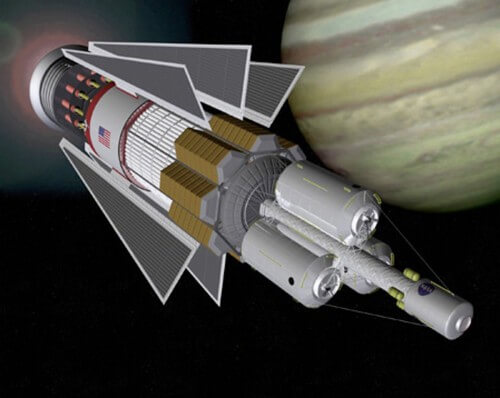
In previous posts I talked about a number of challenges related to a manned mission to Mars, and in particular the difficulty of landing on the Red Planet. Bringing people to Mars is a complicated task, but not impossible.
The flight time of a mission to Mars is measured in months, not days; The fastest route is currently around 180 days or six months.
For robotic landers or rovers, flight time is not a major challenge. As long as the batteries are able to keep its mechanical joints and systems from freezing, the robot doesn't mind waiting.
A manned mission is a different story. Keeping the crew alive and in good physical condition complicates the journey to Mars; The problem is not just providing the astronauts with a heat source. Six months is too long a time for the crew to sit and wait in a small, cramped spaceship, exposed to radiation and in zero-gravity conditions. There are ways to protect the astronauts with radiation shields and spin the spacecraft to create enough gravity to prevent muscle atrophy or at least limit it. But the best way to overcome the challenges involved in bringing people to Mars is simply to shorten the duration of the flight. This is not a new idea, but an idea that NASA has been researching for over 50 years. The preferred method is a nuclear rocket.
The thought of a nuclear-powered missile might raise red flags for some of us. It's a scenario worth wondering about: how would nuclear-capable countries like Russia, China, or others react to the United States sending nuclear material into their airspace? And in the opposite scenario, would a nuclear material launched over the airspace of the United States cause a wave of panic throughout the country? Of course, no one wants a bomb as powerful as Hiroshima hovering over their house.
But nuclear power in space isn't new, just not that well known, and it's easy to be overshadowed by manned flights that are more exciting and less potentially destructive.
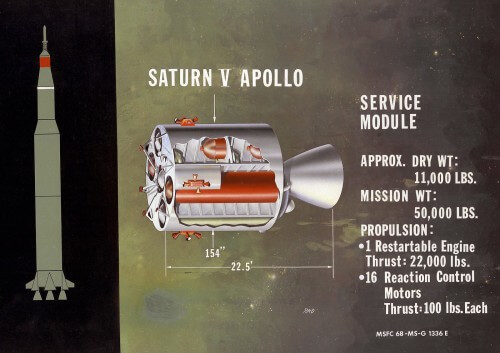
In the early 50s, speculative conversations between engineers and physicists about possible applications for nuclear power finally turned to the field of flight; A nuclear reactor is considered a producer of enough energy to propel a rocket faster than any chemical rocket.
The principle that distinguishes between nuclear and chemical rockets is the source of energy. Chemical rockets get their energy from burning fuel. The oxidizer and propellant are mixed and heated, and the resulting explosion is directed through a nozzle at the end of the rocket to create thrust. The power of nuclear rockets comes from nuclear reactions. Through fission (the breaking of heavy nuclei) or fusion (the fusion of two light nuclei), the energy released heats a propellant that is directed out through the engine nozzle and converted into thrust. In both fission and fusion the product obtained is a lot of energy.
A third type of nuclear propulsion was proposed for use in spacecraft - nuclear pulse propulsion [Nuclear Pulse Propulsion - Y.L.]. Nuclear pulse propulsion uses the energy of a nuclear explosion to propel the spacecraft. Small nuclear bombs explode behind the rocket and give it speed; The energy emitted from the explosion in the form of high-density plasma propels the vehicle. In the mid-60s, this method was studied as part of the Orion program.

One of the first physicists who started working on nuclear propulsion was Robert Bussard [Bussard - Y.L.]. In the early 50s, Bassard combined his data on the unbridled power of nuclear reactions with the available information on chemical rocket propulsion. The hypothetical work suggested that nuclear propulsion might be far superior to chemical propulsion in terms of thrust, range and payload capacity. His findings earned him some notoriety, and in 1955 he joined the Nuclear Propulsion Division at Los Alamos to develop a nuclear rocket engine.
The first step was to develop a small engine-reactor, to prove the concept. In 1959, an experiment was carried out on the first nuclear propulsion engine, called "Kiwi" after the flightless bird. The engine was running - the reactor produced moderate thrust but provided reassurance that nuclear propulsion was a method worth sticking to.
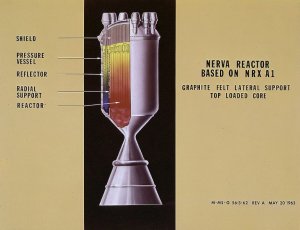
In 1960, the quest for nuclear propulsion was boosted by a new program called the Rover to develop nuclear propulsion capabilities. The funding came jointly from NASA, the Atomic Energy Commission, and the United States Air Force. Inside the rover were smaller programs with separate objectives. The NERVA project - a nuclear engine for rocket vehicles - was dedicated to the development of a nuclear propulsion system for a manned vehicle. Phobus engine project - designed for the development of the engine with the highest power. The XE-P project - an experimental flight engine prototype - was designed to develop reusable nuclear engines.
The rover program progressed at a steady pace throughout the 60s. Throughout the decade, as experiments yielded increasingly successful results, NASA began planning the future of its new propulsion system. Engines produced more and more thrust and burned longer and longer, and it seemed that continued development would produce a rocket capable of sending people to Mars in a reasonable amount of time; The duration of the journey shrunk from months to weeks. In 1968, rover project managers optimistically expected the first nuclear rockets to be on their way to Mars by 1975.
After Apollo 11 landed on the moon in 1969, NASA was hit by significant budget cuts, the impact of which radiated beyond the lunar program. It became clear that a manned mission to Mars was no longer the same priority as national goals after the moon landing was achieved, and the plan for a nuclear-powered mission to Mars was abandoned. Such was the impact on the rover program, which was finally terminated in 1973. The vehicles that launched NASA's first Mars landers, Viking 1 and 2 in 1975, were traditional chemical rockets.
The nuclear propulsion method for missions to Mars has been resurrected many times since the rover program's initial efforts were scrapped. Multiple proposals emerged in the 70s promising a 30-day trip to Mars if NASA committed to developing and implementing nuclear rocket propulsion. In 1987, a proposal was submitted to NASA from the Lewis Research Center in Cleveland, Ohio, with a comprehensive survey on nuclear propulsion in an effort to promote renewed interest in this type of propulsion for spacecraft, and in which the method is presented as an essential technology for the exploration of Mars. Nuclear propulsion is still marketed by many as the best means not only of sending people to Mars, but also to other destinations in the solar system. The six months it might take a chemically powered trip to Mars could be a six month nuclear powered trip to Saturn's moon Titan.
While nuclear propulsion never enjoyed a central role in spaceflight, nuclear energy was for decades a fundamental commodity in space exploration.
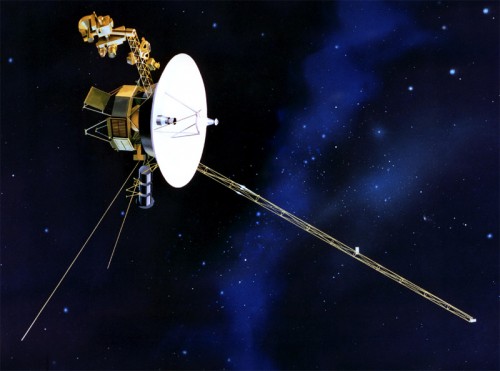
At the heart of many of the planetary research spacecraft sent on long journeys across the solar system lies a radioisotope thermoelectric generator, or RTG - a useful device for spacecraft traveling far from the sun, where solar power is no longer effective. An RTG unit generates power from the decay of radioactive material. The heat produced is converted into electricity which can operate the spacecraft's systems and devices. With a nuclear charge that decays at a slow rate, a spacecraft can live for decades; The Voyager 1 and 2 twins, which recently reached the heliopause (where the solar system officially ends), talked to NASA throughout the duration of the journey thanks to their RTG units.
The same nuclear generators were used by Apollo missions 12 through 17 as a secondary power source for instruments and experiments that remained on the Moon. But not all RTG facilities remained out of harm's way. When Apollo 13 had to abort its moon landing, the astronauts had to return the nuclear payload home, into the Pacific Ocean, just before the crew entered Earth's atmosphere. The nuclear core of the RTG is somewhere at the bottom of the ocean [note: this is not the only RTG that dived into the ocean, but that's a story for another time - Y.L.].
The nuclear material inside the RTG is probably less of a concern than the nuclear material inside a rocket. The nuclear material sent into space as a power source was sent packaged inside a kind of ultra-durable black box built to withstand direct contact with an exploding missile.
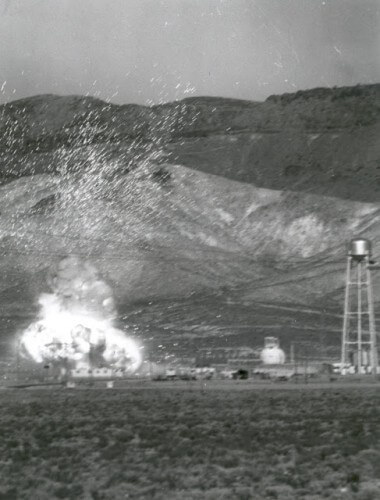
Rockets, on the other hand, explode. A nuclear-powered rocket could be far more unsettling for even the most dedicated spaceflight enthusiast. But if nuclear propulsion is to be used for interplanetary travel, it will not necessarily be the propulsion method for the launch; Chemical rockets will take the planetary spacecraft into orbit, where its nuclear engine will take command. There are currently no clear plans for nuclear-powered rockets to send missions to Mars or anywhere else, and all nuclear material sent into space is safely stored for its journey. On the other hand, it is possible that a day will soon come when nuclear propulsion will become routine in space flights, disturbing as it sounds.
Reading recommendations / selected sources
Stanley Borowski. "Nuclear Propulsion - A Vital Technology for the Exploration of Mars and the Planets Beyond." NASA. 1987.
"Nuclear Pulse Vehicle Study Condensed Summary Report." NASA. 1964.
Annie Jacobson, Area 51. Little Brown. 2011.
_____________________________________
Link to the original article

8 תגובות
It's amazing how you manage to insert politics into every article
Tomorrow there will be an article about snail intercourse in the South Pole
And one of the responses will deal with the culture of Muslims
The experience in science is here with us, are we not responsible for the death of millions of people? Was the atomic bomb that hit Hiroshima necessary to drop on Nagasaki? In my humble opinion there was no need? What are atomic bombs in space for? Aren't there many small black holes that will swallow the atom? In space, the atom does not protect us from a disaster that comes from space, there may be neighbors somewhere, they may not be interested in contact with us, why? Is the human race preparing to fight the neighbors we will meet from beyond our galaxy? If they do visit us here, is our technology primitive compared to them? Me personally, according to my logic, there are indeed cultures of some kind somewhere? As we exist there is a place where they exist??
Is there a big difference between the atom that is used here and the use of space?? The atom is not destroyed in the first place for the protection of humanity in space here with us there is an effect of mutual mass destruction because man aspires to destroy the other who is different from him??? In space he won't go, he will bring total destruction on us in our sphere? Is it possible that we are still in the infancy of our technology? Who knows what the result will be???? Are we already in the heart of disasters as a result of our ambition to reach further?
The earth lives and breathes, and we abuse it, the future holds disasters of biblical proportions, that's why we hurry to leave this house, after its resources have been exhausted and we have become scarce in its resources, therefore it is natural for us to rise up and run away from it?? They will help, space is full of weapons unknown to us that cannot be stopped from wreaking havoc on us, who can control the weapons that are somewhere in space on their way to us?? Have we turned the bullet into a serial and silent killer that doesn't warn in advance? We are in a stage of nightmare, horror, and anxiety, both from space and from our sphere???
We have loosened our bullet defense which protects itself from both radiation and more, our intelligence is a blessing and a curse to us,
Sincerely, Sami Elkayam,
Regarding alternative energy. The governments of the world do not support anything but green energy slogans. The state is unable to pay 50000 NIS per month to a failed boiler that produces 15 KWAAT-HOUR per month. double the
It's in 4000 such lolans (this is the number), and you will receive 200 million NIS a month and you will understand how in 4 years it increased
The deficit of the electric company from NIS 4 billion to NIS 70 billion.
Leave now is an opening for criticism of the need to reform the electric company. A similar process of reducing the rate
for private electricity production, passes also in Europe and the rest of the world. By the way, also the welfare policy that I support,
Brought Europe into bankruptcy, see the entry of PIG”S countries. the world we leave to our children,
He will not necessarily find the scientific solutions to support 7 billion people. The solutions are technologically possible - me
I also believe, but there are geopolitical processes that show in my opinion the entrance to the Second Middle Ages, with centers for the preservation of knowledge as were the monasteries in Europe, but by definition an unpleasant world.
This is neither theoretical nor Star Trek:
Please tell me that you don't feel how difficult and unpleasant the change that is going through Europe and the USA is.
That you believe that in the future a "white" Republican president will succeed in being elected, without him being of Hispanic, Arab, or black descent.
that you don't see a demographic change in Europe. The change is here and now, and will not stop when the oil runs out. is demographic.
Since when was conducting a campaign against the city of "Gaza" that terrorizes 5000000 residents, as impossible as it is today. In 1967 we attacked 3 countries, and in 1973 we were allowed to defend ourselves with difficulty. Today they will not give.
The book Medv Hulit - really a journey between the stars, shows the takeover of the empire by Jihad
the intergalactic It was destroyed only after 300 years, by the explosion of the home planet of Paul Atreides, which produces the
The drug that allows interstellar movement, intuitive navigation (the book written by the son).
What happened in the 2012s is a reality in XNUMX. He wrote and perhaps did not know what he was predicting.
The question is if we close our eyes and imagine that it will pass, it will pass when the oil runs out. I don't think so.
Even without the oil, the religious war will continue. The war will be over Europe and the USA and Australia and Canada, not over Israel. The justification of the war, the relative proportion of Muslims in these countries in 20 years, and see
Already today the elections in the USA, as an illustrative example of what England, France, Germany, Belgium, Norway will look like
which last week awarded a royal medal to a virulent anti-Semite, and more and more. Imagine what it would look like in the states
which receive 100000 immigrant citizens per year: Australia and Canada. Is it so imaginary that a "white" president
Will it be impossible to get elected in the US without being black, Hispanic, or Arab?
If you return to nuclear propulsion - it has been prevented for 50 years. There is propulsion with nuclear fuel but not with a nuclear engine.
And I say: if there is a nuclear submarine, and a nuclear aircraft carrier with fuel for 13 years, a nuclear spaceship should also be allowed. I am aware of the danger in a spaceship compared to a submarine - it can be solved, the safety can be increased
Fallout during launch, by separating the nuclear mechanism from takeoff, and by some kind of self-destruction in the event
In-motion malfunction in the atmosphere. I don't watch too much Star Trek.
I see colonization in space as option B, in the event that this is where the Second Middle Ages begins.
In my opinion, this is exactly what is happening - things were screwed up for other reasons already in 1914, 1939 and in an effort to save culture. In both cases Europe did not save itself. This time the USA will not save Europe, it itself is undergoing a change. This time the change will happen. See how Israel finds it impossible to conduct a campaign against Gaza, in order to understand how it will not be allowed to exist in 20 years.
The first settlers in North and South America also traveled in rickety ships, a one-way journey to an unknown future, some of them died in America. But a stable settlement was achieved in America from 1492, until 2012.
Some are somewhat negative examples like Mexico, where the Spanish ruled, and some are very positive like Canada and the USA where the English have their own. On purpose I say English and not French. The English usually left behind an orderly government and no problems. The French only have problems: Syria, Lebanon, India, China, Cambodia and Vietnam, and in Africa.
The beginning of colonization in space will always be great for us, but the first step must be taken.
The USA canceled all manned space programs, and the Atlas development projects and more. There seems to be a reconciliation with
Persistent recession, Islamization, the victory of the third world over the first. In short: giving up hope for the future looks better. Nuclear propulsion is a means within the limits of today's technology, which provides a good answer to the shortening of distances in space, and certainly to the need for an unrealistic container of fuel, or for movement in the absence of fuel between Israel and Mars.
I don't think in my mind that I will drive to Eilat without pressing the gas all the way. Even if I don't need to. I need, just
In the absence of the technological possibility (rocket propulsion and fossil fuel), we go for ballistic propulsion in a vacuum.
Yaron...I think you see too much Star Trek....Even if we achieve an amazing breakthrough, the path to flight and some sort of settlement is far from here, still very far...let's not talk about anyone who would want to do it
And as of now we have nothing even close.
The best thing that will happen with oil is that it will eventually run out, and in any case, as you have seen a global economic crisis due to huge inflation in all countries.. such things always cause a necessity, which is known as the father of invention. years so your percentages are no longer up to date regarding how effective or not.
There is no doubt that there is an extensive geopolitical problem here, but let the world take care of itself. If people feel that they have been pushed into a corner, they will simply do something extreme..Hispanic or non-Hispanic..
And the religious wars... it's not going to disappear right now... not as long as the oil finances them.
Space travel has stopped, and geopolitical processes in the world show a movement towards a Second Middle Ages, and the collapse of empires guarding Western civilization. Observing the elections in the USA shows that it is possible that there will never again be an American president elected who is not a minority: Hispanic, or black or Arab, because of the open door that has opened democracy to everyone, even without democrats. The processes of childbirth in the world and the very unmoderate pressure we feel on the part of unmoderate and moderate Islam, all over the world and not only in Israel, illustrate how the world will look in about twenty years.
Space travel can change such dynamics, and if nuclear propulsion can restart the process then I will
I think we should go for it. It is possible to build systems that will be relatively safe at a range close to the Earth, and the nuclear element will operate far from the Earth. Fear of fallout, so they will install a self-destruct mechanism. And if a nuclear missile is fired and an anti-missile destroyer is in front of it, there is the same risk here.
In my opinion, we have to fight the paradigm of technological fossilization, and agreement with a continuous economic depression, and the victory of the third world over the first, with a scientific boom. That is, in my opinion, space flight is a link in the chain called Western culture. All the talk about green energy - currently it does not produce 15% of the electricity. And it won't produce either, because of the governments policy to change the electricity tariff paid to the hawkers who install solar panels in every election. Electricity companies do not want to pay 50,000 NIS per month to a small electricity producer. There are thousands of them. There are effective solar solutions - in space. These also need powerful launchers = to launch 27 square kilometers of solar cells into space, where the radiation is 10 times stronger. From a political point of view, in my opinion, we need to grow up, not in racism, for the tendency to introduce large quantities of other liquids into the liquid called Western culture. Not with racism - but there will be no one to guard the embers, if we give democracy without democrats. Western culture with all the death it has brought, also brings enlightenment. The other cultures, including ultra-orthodox Judaism - no.
An ultra-Orthodox woman, in my experience, knows nothing about the Talmud - they leave her out, with complete knowledge.
The Roman Empire collapsed when it stopped imposing Romanization on peoples who settled in the Empire: Germans and the Christian religion. As long as romanization was imposed, "new liquids" that joined the "Roma" tank did not endanger the existing liquid. See below Gallia, Britannia, the province of Egyptia and more. Sometimes it rose
In the destruction of nations: Caesar in Gaul, Treinus in Decia (Yugoslavia), Titus in Israel (Palestine).
An available trip to space can be our second option for saving the Earth, in case we lose the house as it seems now to cultures that oppress women, suppress thinking, where demonstrations of millions are possible.
Is Amy Shira Title a relative of Amy Farrah Fowler?
Why would that bother anyone? Space travel sounds like a much more productive use of nuclear weapons than a world war